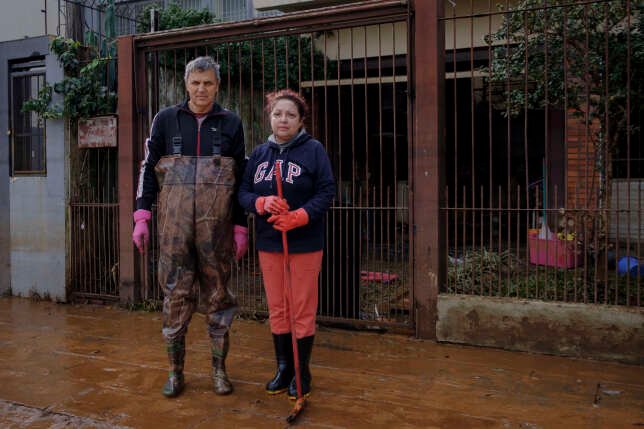“It’s only going to get worse”: in Porto Alegre, with Brazil’s first climate refugees

The two fifty-year-olds progress through the mud in what remains of their neighborhood. For twelve days the couple had been preparing to return to their house, engulfed by water, to see if the building could still be saved – and their old life with it.
For a long time, Silvia and Vitor Titton held out hope, even as rising waters ravaged this prosperous southern Brazilian city, killing more than 160 people and forcing hundreds of thousands to abandon their homes. But their last glimmers of optimism are now extinguished.
Fish rot on the ground in front of the house. Everything is covered in a varnish of sticky, fetid mud. Their daughter’s theater costumes, an old camera, a lifetime of memories lost. As Silvia picks up and examines the debris, she realizes she will never be able to go back. But where to go? she wonders. One thing is certain: this corner of Porto Alegre, subject to increasingly frequent catastrophic flooding, is no longer her home.
“It’s beyond my strength. I can’t live in fear of water, in fear of rain.”
For years now, scientists have been warning about population movements due to climate change, which, because they will affect millions of people, are destined to reorganize human distribution across the globe.
Rethink your way of living
According to the World Bank, more than 216 million people could be forced from their homes by rising sea levels, flooding, desertification and other manifestations of climate change. The Institute for Economics and Peace is reporting estimate to 1.2 billion people. In a reportthe European Parliament was concerned about the future “climate refugees”.
But it is not a question of the future, the question arises in the present, very immediately. In 2022, floods in Pakistan displaced some 8 million people. In Ethiopia in 2023 and in Kenya this year, hundreds of thousands will have had to leave their homes because of floods. The same, therefore, in Brazil.
“Brazil will not remain a one-off exception, insists Andrew Harper, a senior official at the United Nations High Commissioner for Refugees. We are witnessing the beginnings of a phenomenon that will become more frequent and more extreme, and place more people in a vulnerable situation, with no other choice but to leave, in search of a safer place to live.”
The massive floods that hit at the very end of April affected almost every municipality in the southern state of Rio Grande do Sul. Entire towns are still under water today. Areas that were spared have had to accommodate hundreds of thousands of displaced people. Many of them say they have no




